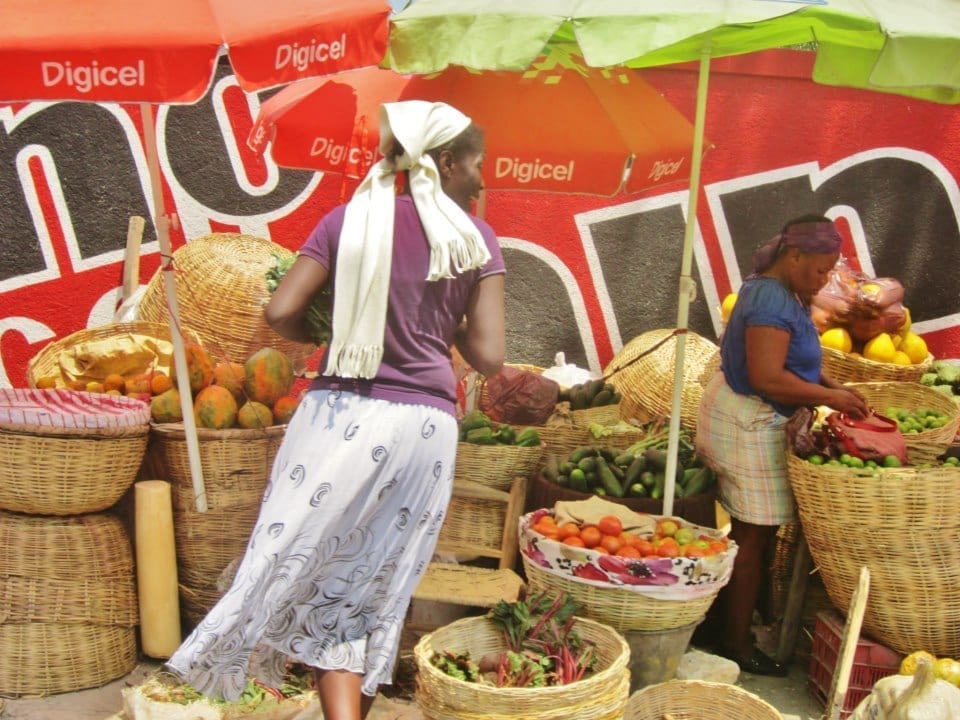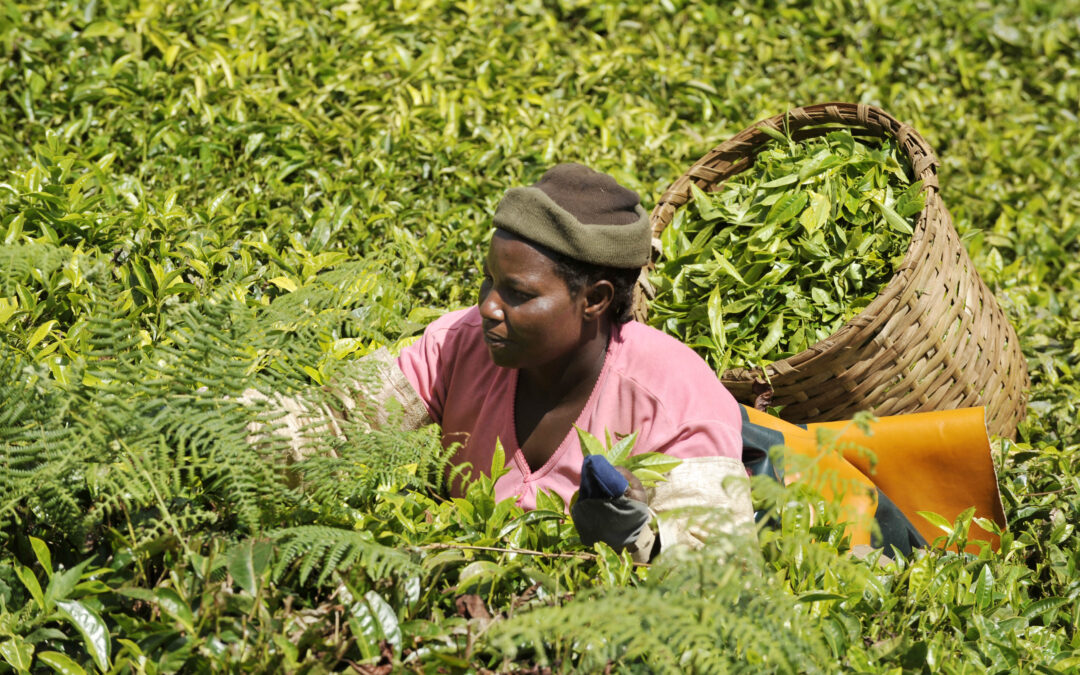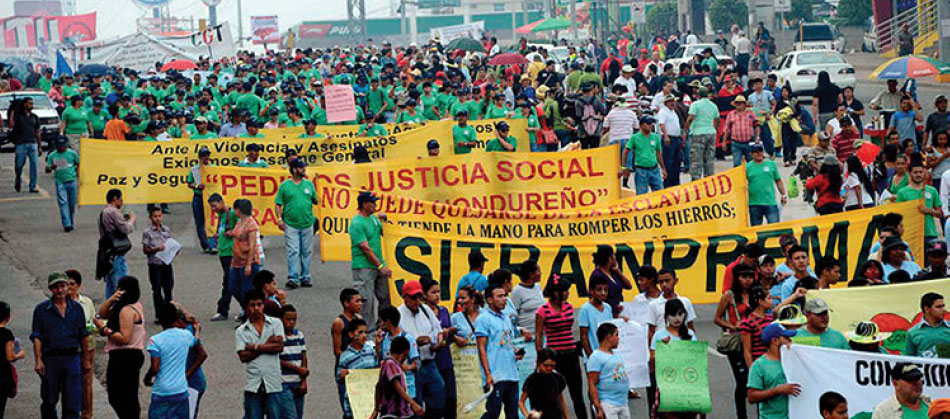
Aug 25, 2021
In Nigeria, through a coordinated campaign by the Organization of Trade Unions of West Africa (OTUWA), West African Informal Sector Workers Network Working Group, Federation of Informal Workers’ Organizations of Nigeria (FIWON), Nigeria Labor Congress (NLC) and Trade Union Congress of Nigeria (TUC), unions are demanding increased government investment in healthcare for informal-sector workers and their families—including the provision of adequate hospitals and clinics in marginalized communities.
“Healthcare is a human right!” said FIWON General Secretary Gbenga Komolafe at a press conference in Abuja this month, adding that the COVID-19 pandemic has further exposed Nigeria’s inadequate healthcare system, especially in the informal sector. “We will use all available legitimate means to push this campaign. We will do rallies and protest on the street.”
NLC and TUC representatives at the conference also lent their organization’s support to the campaign.
Although the Economic Community of West African States (ECOWAS) recommends that member states allocate 15 percent of their budget to healthcare, Nigeria budgets only 4 to 6 percent—among the lowest in Africa, said Komolafe.
The region’s signatory governments are required by ECOWAS Fundamental Principles to promote and protect human rights in accordance with the African Union (AU) Charter on Human and Peoples’ Rights—including provision of social protections such as healthcare—but Nigeria’s workers are not adequately covered, said OTUWA Executive Secretary John Odah.
“We now have a responsibility to … call on government to put more funding into social protection, especially healthcare,” said Odah.
OTUWA’s “Healthcare Is a Human Right” campaign, launched in Abuja in March last year, unites OTUWA affiliates in a fight for equal and fair health care access for all who live within the ECOWAS region.
2 billion informal-sector workers comprising 61 percent of the world’s workforce are not covered or are insufficiently covered by laws or working arrangements guaranteed to formal workers. Although informal-economy workers create more than one-third of the world’s gross national product, they have little power to advocate for social security benefits like healthcare, living wages and safe and secure work. By joining in unions or other worker associations, workers in the informal economy can gain the collective power they need to make change, according to an International Labor Organization (ILO) study.

Jul 29, 2021
On this year’s July 30 World Day Against Trafficking in Persons, a coalition of rights organizations including the Solidarity Center are highlighting widespread wage theft perpetrated against Southeast Asia’s migrant workers. Although this form of labor exploitation has been thrown into stark relief during the COVID-19 pandemic, it is a long-standing problem in the region.
“Wage theft is a crime against humanity. If the global pandemic can be overcome, why not wage theft?” says Plantation Rural Education and Development Organization (PREDO) Sri Lanka Executive Director Michael Joachim.
The Justice for Wage Theft campaign is demanding governments address wage theft perpetrated against millions of migrant workers in the wake of the pandemic—including those who voluntarily returned home or were forcibly repatriated, often after employers unilaterally severed their contracts and stopped paying them their earned wages. Many such returnees now find themselves trapped in debt bondage to labor recruiters to whom they owe money on interrupted contracts and, sometimes, for emergency air fare, putting them at risk of labor exploitation. Debt bondage is one of the most prevalent forms of forced labor worldwide.
“The campaign is asking that indebted returnees be protected from exploitation and that migrant workers who returned home in fear for their lives receive their earned wages for work they completed,” says regional migrant rights expert and Solidarity Center Senior Program Officer Miyuru Guansinghe.
The Justice for Wage Theft’s website highlights coalition members’ work and provides a mechanism for collecting wage theft cases and signatures on a public petition for a just compensation mechanism. Coalition members are ASEAN Services Employees Trade Union Council (ASETUC), Cross-Regional Center for Refugees and Migrants (CCRM), Lawyers Beyond Borders, Migrant Forum in Asia (MFA), South Asian Regional Trade Union Council (SARTUC) and the Solidarity Center.
In two reports covering the period December 2019 through June 2021, the campaign documented more than 1,800 wage theft cases perpetrated against people migrating from Bangladesh, India, Indonesia, Nepal, Pakistan and the Philippines to work in agricultural, domestic, construction and other sectors in Bahrain, China, Kuwait, Lebanon, Malaysia, Maldives, Oman, Philippines, Qatar, Saudi Arabia, Sri Lanka and the United Arab Emirates. Volumes 1 and 2 of “Crying Out for Justice: Wage Theft against Migrant Workers” include hundreds of cases identified by the Solidarity Center during direct interviews with affected workers in five Sri Lankan districts.
Wage theft is an indicator of forced labor under International Labor Organization (ILO) standards, says MFA. Under ILO standards, states must develop wage-theft-eradication measures and effective justice mechanisms. Workers are also entitled to effective remedies—including prosecution of employers under criminal law, and payment of earned wages and other compensation, and governments must ensure workers’ wages are paid regularly and a final settlement of all wages is effected upon termination of an employment contract.
Forced labor is the most common result of human trafficking, with an estimated 25 million people trapped in often slave-like conditions. A United Nations report last year found that the percentage of trafficking victims exploited for forced labor is increasing over time and that surveyed countries reported a threefold increase in the number of trafficking victims from 2003 through 2018. Forced labor generates up to $150 billion a year in illegal profits for traffickers—including $51.2 billion made illegally from forced labor exploitation in domestic work, agriculture, forestry, fishing, construction, manufacturing, mining, utilities and other industries, says the International Labor Organization (ILO).
“Human trafficking is a violation that should have no place in civilized society, ” says Saviya Development Foundation Training and Program Director Thushara Senanayaka.
The Justice for Wage Theft campaign is an offshoot of MFA’s regional network of nongovernmental organizations, associations and trade unions of migrant workers, and individual advocates in Asia who are working to protect migrant worker rights and welfare. Such initiatives include efforts in coalition across the globe to improve COVID-19 vaccination access for migrant workers and their family members.
You can support the Justice for Wage Theft campaign by completing its online petition, “Say Yes to Justice!”

Jul 28, 2021
In a global context where most working people and their communities are being denied a say in their future according to the International Trade Union Confederation (ITUC), Kenya’s Central Organization of Trade Unions (COTU-K) is effectively engaging government and policy makers to represent the needs of working people in the development of climate change solutions.
“[N]early nine out of ten countries are… not using social dialogue,” says ITUC General Secretary Sharan Burrow about climate plans submitted by governments under the Paris Agreement on Climate Change. As defined by the International Labor Organization (ILO), social dialogue structures and processes are tools for promoting consensus building and democratic involvement among the main stakeholders in the world of work—representatives of governments, employers and workers—on issues of common interest.
In Kenya, the climate crisis is prompting more frequent and prolonged droughts, erratic rainfall, intermittent flooding, water scarcity and increased incidence of climate change-related diseases—which threaten people’s jobs and livelihoods in all sectors, especially agriculture, fishing, forestry, mining and tourism. Unions, says COTU-K, must take their place at the table to advance worker-centered climate solutions toward a sustainable and thriving future.
COTU-K, a Solidarity Center partner, has successfully represented the interests of Kenya’s most vulnerable citizens in multiple fora and processes, contributing to the country’s Climate Change Response Strategy, the National Climate Change Action Plan, Climate Change Act and, most recently, in the 2020 process of updating Kenya’s Nationally Determined Contributions (NDCs) under the Paris Agreement to include just transition elements. COTU-K is also a member of Kenya’s National Climate Change Council—a body chaired by President Uhuru Kenyatta that advises government on the development of climate change policies and legislation.
COTU-K’s just transition program is rooted in its vision of climate justice, which advocates for a low-carbon development path and actions to address climate change while simultaneously prioritizing the creation of good jobs and ensuring social justice, rights and social protection for all.
“Climate justice [will ensure] that the environmental and social costs of unsustainable production and consumption are met by the economic agents responsible for them,” and prevent the burdens of changes benefiting everyone being placed disproportionately on a few or the most vulnerable, says COTU-K.
The development of climate-related programs and policies requires active and informed public participation, says COTU-K. To this end, COTU-K is pursuing climate-justice coalitions with like-minded organizations, supporting climate and labor justice at both national and county levels of government, and providing worker-to-worker and union-to-union exchanges on effective climate justice strategies.

Jul 20, 2021
In Honduras, where union leaders are targeted with violence and even murdered for trying to form unions and improve workers’ lives, Darlin Oviedo, president of the apparel union SITRAJASPER (the Union of Workers of the Jasper Company), recognized the signs that he might be next.
In October, a motorcycle driver pulled alongside his motorcycle, staring at him with threatening glances, Oviedo told Solidarity Center, speaking through an interpreter. When he saw that the driver carried a high-powered weapon, he says he wove through traffic, trying to get away. The other driver followed him until Oviedo took cover at a shop. In the following months, Oviedo was followed two more times and, along with the employer’s attempts to undermine the maquila worker union he leads, Oviedo recognized he was not safe. He has since left his family for an undisclosed location.
“When people stand up to defend their rights and say there shouldn’t be any rights violations against workers, that’s when employers decide to mete out violence against union leaders like us,” Oviedo said. “I know that I lived through the first two attempts on my life but who’s to say there is not a third attempt coming at me.”
Oviedo says he and union general secretary, Selvin Peña, have been targeted since October, when workers rallied to demand the apparel factory bring back workers who wanted work after COVID-19 restrictions eased. Although the employer did call back the workers after the rally, Oviedo says the employer then began blaming all factory problems on the union, in what he says is retaliation for union success in improving worker rights on the job.
“Conditions were really difficult at the factory before the collective bargaining agreement,” says Oviedo. “But through the collective bargaining agreement, we won a really, really good contract, and that may be something the employer may not want to wholeheartedly support, so that is why they are going after the union.”
Workers Improve Job Safety with Solidarity
Forming a union at the Jasper garment factory was hard and took many years. Garment workers first created a union in 2006, but with workers facing constant employer harassment, including being fired for their participation, the union did not last. In 2016, 38 workers came together to rebuild the union and negotiate a collective bargaining agreement that covers some 2,440 workers.
Oviedo says among the many improvements, the contract restructured the occupational safety and health committee to focus on prevention, especially repetitive motion injuries that maquila workers frequently experience. The contract also ensures workers can speak up without retaliation when supervisors use abusive language, and it increased food and transport subsidies.
Oviedo took the lead in forming the new union. “When I first started at the factory, I noticed the production quota was so high, and demands so high for workers, I spoke up,” he says. “Because I spoke up about it, I was almost fired. Other workers felt the same. We started organizing quietly. They fired four of us and two of us won reinstatement.”
Challenging Anti-Union Violence
Oviedo has been active in the struggle to counteract anti-union violence since 2017, when he contacted Network Against Anti-Union Violence about physical assaults on two SITRAJASPER members and the murder of Roger Vásquez, a leader of another maquila union, SITRAGENESIS. The men were attacked as union activists participated in pro-democracy rallies in Choloma, in the Cortés department, after the presidential election.
He joined the Network’s national coordinating team and in May, the Network recognized him with an award for his union contributions and for his efforts to defend working people who have been victims of anti-union violence. Jorge Hernández at the Network Against Anti-Union Violence, honored Oviedo, and said Oviedo and his union sisters and brothers in SITRAJASPER, face “acts of intimidation and threats because of their struggle to build a more just society.”
In 2019, two union leaders in Honduras were murdered and dozens more physically attacked, threatened and harassed for their activism in advocating worker rights, according to the Network, which releases an annual report documenting harassment, retaliation and attacks against workers for their union leadership. (Read the 2020 report in Spanish.)
Despite all he is facing, Oviedo says worker victories give him hope. He cites an incident when the employer sent everyone home due to supply shortages forcing workers to use vacation time.
“We weren’t asking for vacation and that’s against the law to make us assume the cost of the business loss,” he said. “Because we were organized, we won back pay for some of the days we were home. That was a really inspiring moment for us—we saw that because we were organized we could win our rights.”
Holding Governments Accountable
Addressing anti-union violence means ensuring decent work and public safety, Oviedo says. “Economic inequality continues to widen for as long as these union campaigns are violently repressed, driving people to flee.”
The AFL-CIO is urging creation of a Central American regional migration framework that “centers on human rights, protects and empowers workers, safeguards the environment, and produces positive labor market outcomes for all working people.”
Further, the federation proposes aggressively enforcing labor standards under the U.S.-Central America Free Trade Agreement (CAFTA), and reopening CAFTA negotiations to improve and update its labor standards and enforcement mechanisms to align with the higher standard set under the U.S.-Mexico-Canada Trade Agreement.
“Right now we’re living through a moment of a lot of tension between workers and the company,” says Oviedo. “We must stand up to them because it’s our right. I have had to relocate to maintain my safety, but it is because it is our right to decent work.”
Jul 15, 2021
A hidden video-surveillance camera discovered on Monday was recording the entrance of the central office of the Confederation of Free Trade Unions of Ukraine (KVPU)—an act described by the organization as illegal and a possible attempt to interfere with trade union activity.
“The KVPU is deeply concerned about possible negative consequences for people, especially for activists and whistleblowers who visited our [Kyiv] office,” says KVPU Chairperson Mykhailo Volynets. Visiting diplomats and politicians may also have been illegally surveilled.
Describing the discovery as “alarming,” KVPU International Secretary Olesia Briazgunova says the organization is demanding a thorough police investigation and the opening of a criminal case.
“A lot of people come here to get legal assistance, discuss trade union activities or inform about corruption,” says Volynets, who fears for those helping KVPU prevent the adoption of draft laws that narrow worker rights in contradiction of international labor standards and those who are highlighting corruption in the coal industry and state-owned transport enterprises.
The recording of people without their consent, except in specific cases established by law, is prohibited by Article 307 of the Civil Code of Ukraine, says KVPU.




